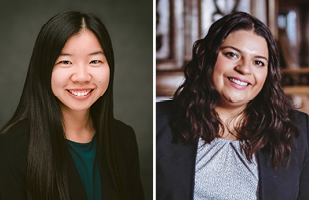Students Devote Time To Aid Others With Legal Issues

Kaela Orrell (left) and Natalie Gottfried (right) were two of 49 new attorneys recognized for spending more than 150 hours during law school doing pro bono work.

Kaela Orrell (left) and Natalie Gottfried (right) were two of 49 new attorneys recognized for spending more than 150 hours during law school doing pro bono work.
A woman who was struggling to get a job because of past criminal convictions was looking for help. The mother of two went to a legal clinic at the University of Akron School of Law and met Natalie Gottfried, a law student staffing the clinic.
Gottfried assisted the woman with filling out a long and complex petition asking a court to expand the woman’s employment opportunities. If approved, she would receive a certificate of qualification for employment (CQE). The certificate demonstrates that an individual has undergone a thorough review process to show that the person shouldn’t be excluded from consideration for jobs because of a prior conviction.
Gottfried said the woman knew the convictions “did not paint her in a good light.”
“But she had made a lot of changes since then, and she wanted the CQE to reflect the hard work she put in to change herself,” Gottfried said.
The case was one of many Gottfried spent time on while in law school. When she was admitted to the practice of law in November, she and 48 other new attorneys were recognized by the Ohio Supreme Court and the Ohio Access to Justice Foundation (OAJF) for providing more than 150 hours of pro bono legal services during law school.
Sophia Chang, OAJF’s pro bono director, said it’s important to commend these new attorneys for their work and clear commitment to serving their communities. It’s also important because the need for legal representation is substantial. About three out of four households encounter one or more civil legal problems each year. Yet half of individuals with low incomes don’t know if they could find and pay for an attorney. To help close the gap, the American Bar Association encourages attorneys to spend 50 hours annually offering free legal help.
Student Assists People Seeking Asylum
Kaela Orrell also donated more than 150 hours of her time while in law school. The graduate of Case Western Reserve University School of Law said she helped people from other countries needing to complete applications requesting asylum. Orrell noted that the forms can be confusing and full of legal jargon, and there isn’t enough pro bono representation to meet the demand. Once the application was drafted, an attorney reviewed it, and the applicant was able to submit a vetted application to the appropriate court or agency.
When Orrell started law school, she was drawn to immigration law because she was adopted from China, but she wasn’t sure of the exact path she planned to pursue as an attorney.
“I wanted to keep an open mind,” she said.
After a summer interning at Catholic Charities in Cleveland, she decided immigration law would be her focus. During the internship, she helped individuals apply for green cards or temporary protected status, researched conditions in their countries, and drafted briefs for their cases. After graduating from law school, she joined Catholic Charities as an OAJF fellow representing children in immigration matters.
“I enjoyed what I was doing and knew I was making a difference not only in the client's lives, but also for the organizations and the attorneys I was working with,” she said.
Pro Bono Good for Clients, Students, and Legal Profession
When law school students devote their time to help people who need legal assistance, the benefits are many. First, students build their practical skills, Chang noted.
“They are able to explore many different areas of law, shadow practicing attorneys in their work, and also network with attorneys who give back by doing pro bono legal work,” she explained.
The students in turn provide valuable support to the attorneys they work alongside. Chang said student research and assistance allow attorneys to move forward on cases. If a client wants to seal a criminal record, for example, the person’s criminal history must be checked and a student is often assigned to the task.
“This work sometimes takes a significant amount of time — time that an attorney can use on other issues or matters,” Chang noted.
Also, the individuals needing legal assistance are served. Gottfried said her pro bono experiences made her aware of what a privilege it is to be an attorney.
“There were so many people who [came to the clinic and] just wanted to make a better life for themselves,” she said. “We really need to use this privilege to help those around us. Everyone deserves justice and fairness, no matter who they are or what their income is.”


